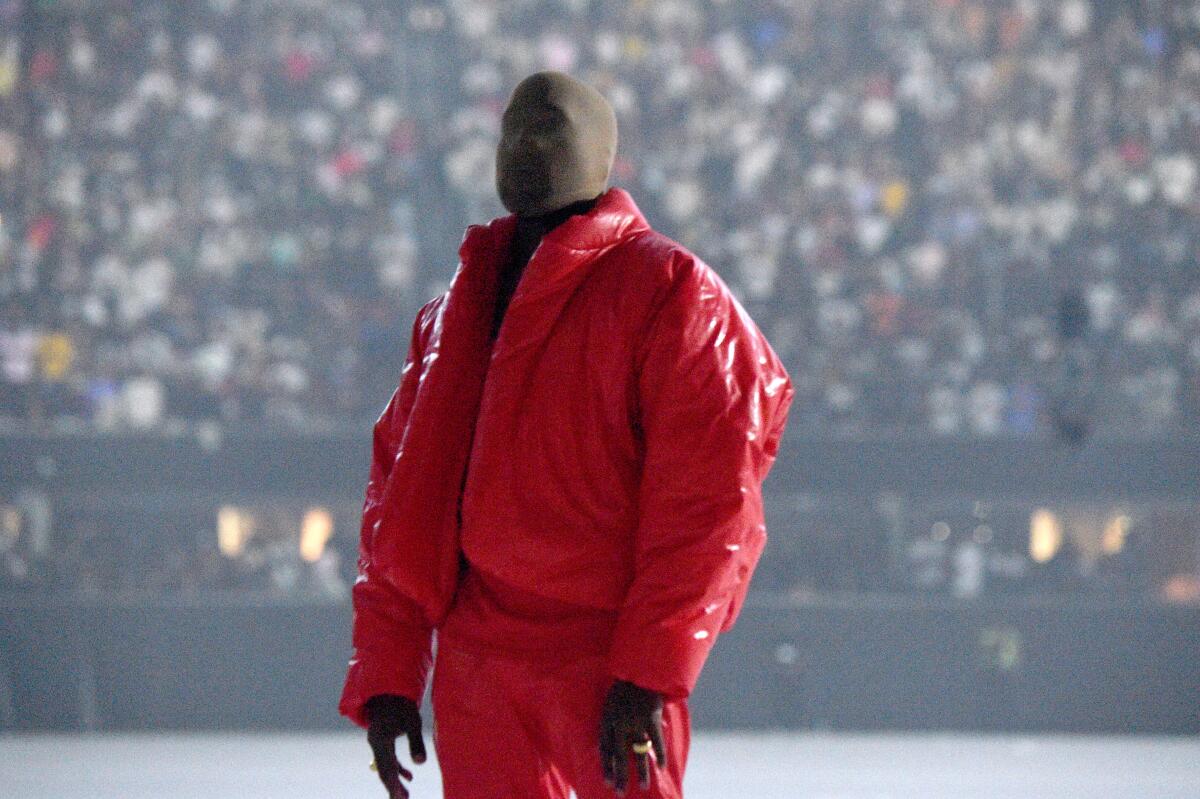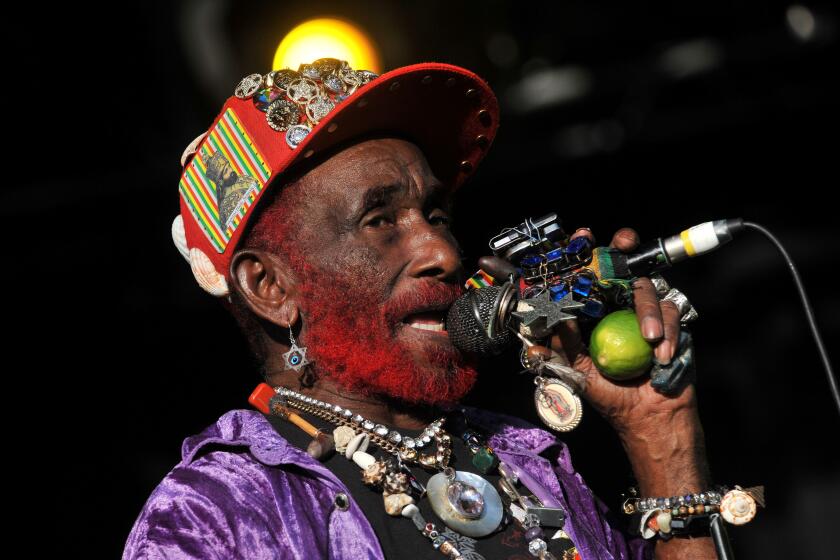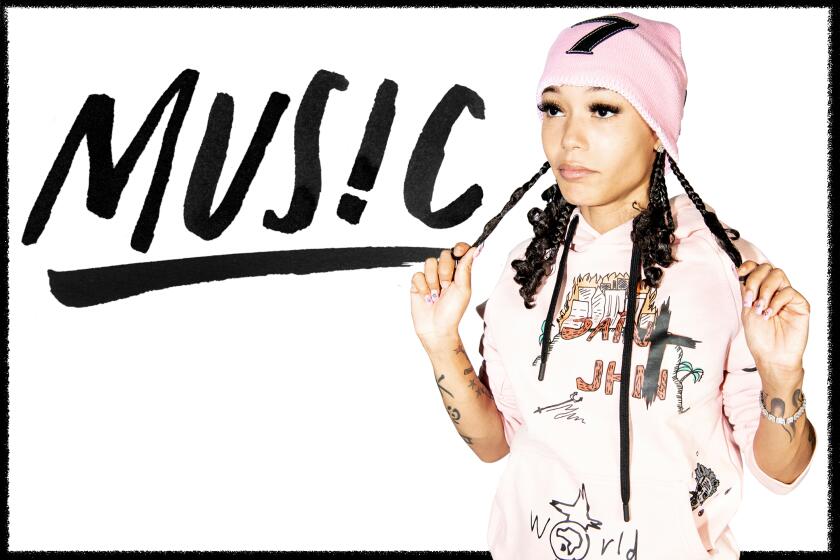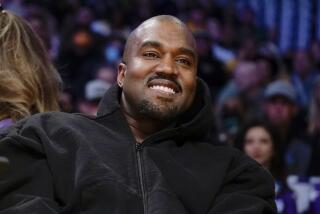Review: Kanye West reeks of desperation on dispiriting, exhausting ‘Donda’

- Share via
Kanye West, like so many of the dubious Trump-era thinkers he’s aligned himself with during the last half-decade, likes to suggest that he’s just asking questions.
Questions about freedom. Questions about celebrity. Questions about race and gender and redemption that other people are too scared to ask in a woke America.
But if that was ever true, it isn’t really anymore.
For years — but especially throughout the lengthy and chaotic rollout of his 10th solo album, “Donda,” which finally dropped on Sunday morning in the wake of his polarizing embrace of the former president, a failed presidential run of his own, a highly public separation from his wife and no fewer than three stadium-sized listening events — we’ve been the ones asking how far we’re willing to go with West as he ventures ever deeper into his own megalomania.

That third event, for which he invited Marilyn Manson to stand next to him at Chicago’s Soldier Field last week, wasn’t a question but an answer.
This far, West seemed to be declaring. At least this far.
Lee “Scratch” Perry, who produced landmark recordings for Bob Marley and helped invent dub music at his famed Black Ark studios, died Sunday at age 85.
Manson is the veteran shock rocker facing multiple lawsuits over accusations of alleged sexual abuse. And Kanye was right that Manson’s presence wouldn’t dissuade people from following him (just as his MAGA hat and his infamous remarks about slavery being a choice didn’t): On Monday, spots 1 through 10 on Spotify’s closely watched U.S. Top 50 chart were filled by tracks from “Donda”; the streaming platform said the LP had set a new record for the most streams in a single day in 2021.
Why start this album review with talk of rhetoric instead of music? Because music has never seemed less central to Kanye’s enterprise than it does at the moment.
Certainly, Manson makes no significant musical contribution to “Jail” or “Jail pt 2,” the pair of “Donda” tracks on which he appears — in the first case as a credited songwriter and in the second as a songwriter and featured performer alongside DaBaby, who Kanye also brought out in Chicago amid widespread criticism over homophobic comments DaBaby recently made.
For West, Manson — who sings along with his host on a couple of lines in “Jail pt 2” — is merely a symbol: a supposed fellow victim of the cancel culture that apparently keeps coming for Kanye (but so far has done nothing to slow his advance in the fashion industry that made him a billionaire).
Think about how aggrieved West must feel to have orchestrated this. Two albums ago, on 2018’s “Ye,” he used his song “Violent Crimes” to tell us that becoming a father to two daughters had led him to “see women as something to nurture, not something to conquer” — the lowest form of male enlightenment, sure, but still.

And now here he is, on an album named after his late mother, drafting an accused predator — precisely because of the allegations against him — to make the point that men like him — famous, rich, maligned — have suffered too greatly for their sins.
DaBaby argues the same thing — a more charitable interpretation is that we’re all sinners and that only God can forgive — in his verse in “Jail pt 2”: “I said one thing they ain’t like / Threw me out like they ain’t care for me,” he raps, “And that food that y’all took off my table / You know that feed my daughters, huh?” (Please allow these daughters to stop doing their fathers’ emotional labor.)
As with Manson, though, Kanye seems less invested in what DaBaby brings to the song than in what DaBaby represents to the world. In a since-deleted Instagram post on Sunday, West wrote that he insisted on including DaBaby’s verse because “he was the only person who said he would vote for me in public” — a quid pro quo between two artists who view themselves as among the few who get it.
Delta variant be damned, many of our favorite artists are either performing at star-studded festivals, headlining concerts or releasing new albums this fall.
Even with 27 tracks stretched over nearly two hours, “Donda” doesn’t register as an organized aesthetic experience so much as a means of maintaining Kanye’s powerful social standing; it’s a reason to keep us talking about him as he prepares his next Yeezy collection and continues to stage whatever grand piece of TMZ theater he’s plotting with Kim Kardashian, who appeared at the end of last week’s listening event for a kind of reenactment of their 2014 wedding.
For all the time he evidently took to complete it, the album feels slapdash — a messy collection of stray thoughts about his mother, about divorce, about God, about the bipolar disorder he’s referred to as his superpower. After “Donda” dropped, he took to Instagram again to say that his label had released it without his approval, as though he hadn’t finished tinkering with it.
But maybe he was just looking for another way to create more controversy about the album (or to fend off suspicions that he was purposely getting out of Drake’s way ahead of the planned release of his new LP on Friday). Indeed, throughout “Donda’s” tortured arrival, Kanye has seemed somehow unaware that we know he’s trolling us, which would be laughable if the particulars of his pay-attention-to-me act weren’t so dispiriting. Outrage is valuable in art, and providing it has clearly been good for Kanye’s business; “Donda’s” all-but-assured debut at No. 1 will tie Eminem’s record of 10 consecutive chart-toppers. But as with Eminem — not to mention Trump since he left the White House — the provocations have taken on the stink of desperation.

So what, at last, about the music? “Donda” draws from the various Kanye eras that have come before, plus a lot more besides; it blends the harsh industrial hip-hop of “Yeezus,” the church-organ gospel of “Jesus Is King,” the gothic swagger of “My Beautiful Dark Twisted Fantasy” and the bleeping electro-pop of “808s & Heartbreak.” There’s a Brooklyn drill track with Fivio Foreign (“Off the Grid”); a heaving R&B jam with the Weeknd (“Hurricane”); even an uptempo party song (“Believe What I Say”) that echoes the seemingly long-lost Kanye of exuberant mid-2000s hits like “Stronger” and “Good Life.”
Some of the stuff is thrilling; some of it’s gorgeous. At this point, Kanye’s skill as a record-maker is beyond dispute, though the number of producers credited on most of these tracks — eight for “Pure Souls,” seven for “New Again” — invites speculation as to how closely involved he was in the studio this time. The stylistic range is impressive but exhausting in a way distinct from 2016’s “The Life of Pablo”; this album lacks a sense of momentum to push you from the arena-rock guitar squall of “Jail” to the throbbing club beat of “God Breathed” to the dense choral vocals of “24,” which means nothing builds on anything else.
West’s rapping is similarly scattershot, with potent if typically self-flattering lines about an empty $60 million home giving way to cringey dad jokes like this one from “Lord I Need You”: “We used to do the freak like seven days a week / It’s the best collab since Taco Bell and KFC.” (That’s two albums in a row now we’ve had to hear Kanye liken Kardashian to fast food, after his iffy Chick-fil-A shout-out on “Jesus Is King.”) He’s most focused in “Jesus Lord,” enumerating all the ways he tried to heal himself — sex, religion, “too many pills, so much potions” — in the aftermath of his mom’s death.
Elsewhere, though, West sounds distracted, which leaves the show open to stealing by his many, many guests: a mournful Lil Baby on “Hurricane,” a rowdy Westside Gunn on “Keep My Spirit Alive,” a euphoric Roddy Ricch on “Pure Souls.” Among the other artists featured on “Donda” are Playboi Carti, Young Thug, Kid Cudi, Lil Yachty, Travis Scott, the late Pop Smoke and West’s old frenemy Jay-Z — a multigenerational testament to the pull Kanye exerts even at his most toxic.
And yet West’s decision to release “Donda” in only an edited version, with swear words muted — couldn’t he have just told people not to curse? — feels like one more indication that music has dropped down his list of priorities. On “Jonah,” a shimmering digital-soul cut that might be the album’s most affecting, Vory and Lil Durk reach deep to explore the pain of losing friends and family members, only to have their verses repeatedly interrupted by distracting drop-outs.
For whose benefit did Kanye adjust the songs this way? God? His children? Listeners not already offended by the gratuitous presence of an alleged rapist?
“Donda” makes you wonder whether Kanye even knows.
More to Read
The biggest entertainment stories
Get our big stories about Hollywood, film, television, music, arts, culture and more right in your inbox as soon as they publish.
You may occasionally receive promotional content from the Los Angeles Times.











